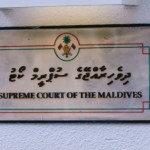The Human Rights Commission of Maldives (HRCM) 2013 annual report has revealed that incidents of torture in detention are increasing in the Maldives.
Among the issues noted during the commission’s visits to places of detention – in particular, prisons and police detention centers – and from the cases submitted to the commission were:
- Detainees being held in cuffs for 24 hours – sometimes for 15 – 30 day – with removal only for using the toilet and for eating
- Detainees not being provided with necessary items for cleaning themselves, or with pillows and blankets for sleeping
- Overcrowding of cells
- Police officers cursing and hurting detainees inside vehicles during transfer
- Serving of rotten food
- Not keeping proper records of detainees including medical, search, and solitary confinement records.
- Not providing family meetings and phone calls
- Police not providing details of arrested people to HRCM
- Police entering homes without a court order
- Addressing underage detainees inappropriately
According to the report, out of the a total 596 recommendations regarding state detention facilities made by the HRCM – including prisons, detention centers and homes for people with special need – only twenty percent have been fully implemented.
The report also noted that the commission faced “huge obstacles” in conducting investigations, resulting in delays the completion of research.
These obstacles included the failure of relevant institutions to provide documents, delays of state institutions in implementing commission recommendations, and the refusal of some government ministries to meet with the commission.
Statistics
With forty cases initiated by the commission, a total of 719 cases were received in the year 2013 – of which 218 were completed. With pending cases from 2000 -2012, the commission completed investigations for total 352 cases within the year.
The rising incidence of torture was reflected in the number of cases submitted,and a total of 72 cases of degrading treatment and torture were submitted within the year.
Among them were cases submitted by victims and their families stating that they were tortured during the police custodial department detention during investigations. Detainees also submitted cases of being denied parole, the detention of persons released under the ‘second chance’ program, and the implementation of sentences which contravened court verdicts.
The highest number of cases – 134 – were submitted regarding the right to a good standard of health care; 77 case related to the right to fair administrative action; 86 cases concerned children, the elderly, and persons with special needs; and 90 cases submitted regarding labour rights violations.
Judiciary
“Citizens had many concerns about the condition of the judiciary in 2013 as well,” read the report, which reported the slow speed at which cases are attended to by the courts and the failure to take action against judges accused of misconduct.
In the report, the HRCM called on the Judicial Services Commission to increase and strengthen it’s role in reforming the judiciary, and for the People’s Majlis to pass important laws such as the penal code, and the criminal procedure and evidence bill.
The HRCM is currently working on an assessment of the Maldives human rights obligations in the judicial sector – with the financial assistance from UNDP – to ensure the judicial system in the Maldives is independent, just, and accessible.
The report mentioned, however, that courts had refused cooperate with the commission’s monitoring programme as the commission “did not get the cooperation of the Supreme Court”.
Freedom of assembly and MP’s behaviour
Notable achievements listed in the report were the passing of a number of bills such as the prisons and parole bill, the anti human trafficking bill, anti-torture bill, access to information bill, the sexual offences bill, the political parties bill, and the freedom of assembly bill.
Regarding the controversial Freedom of Assembly Act, the commission stated that “citizens were relieved” when it was passed and enforced, and that the legislation aimed to minimise restriction of the rights guaranteed by the constitution.
The bill had been criticised prior to its ratification, with local NGOs stating that it impinged upon a number of fundamental constitutional rights and “significantly challenges the entire democratic system of governance”.
The bill was also criticised by the the Maldives Journalists’ Association, Forum Asia – a regional human rights organisation -and the Tourism Employees Association of Maldives. The opposition Maldivian Democratic Party (MDP) argued that it was a reactive measure against the MDP-led anti-government protests calling for an early presidential election.
The “irresponsible acts” of parliament members throughout the year – including violence within the Majlis premises and demonstrations during 2013 presidential address, were mentioned as an issue of concern. Another issue raised regarding MPs was the proposal of amendments to laws in order to “protect personal interests”.
Other prominent issues concerned the large number of child abuse cases, including sexual abuse and use of children in crimes, along with an increased incidence of rape and other crimes against women.
Violation of the rights of migrant worker, including non-payment of wages, the withholding of their personal documents, and reports of inhumane abuse by their employers and the public was also noted.
The HRCM Annual Report 2013 can be downloaded here.





